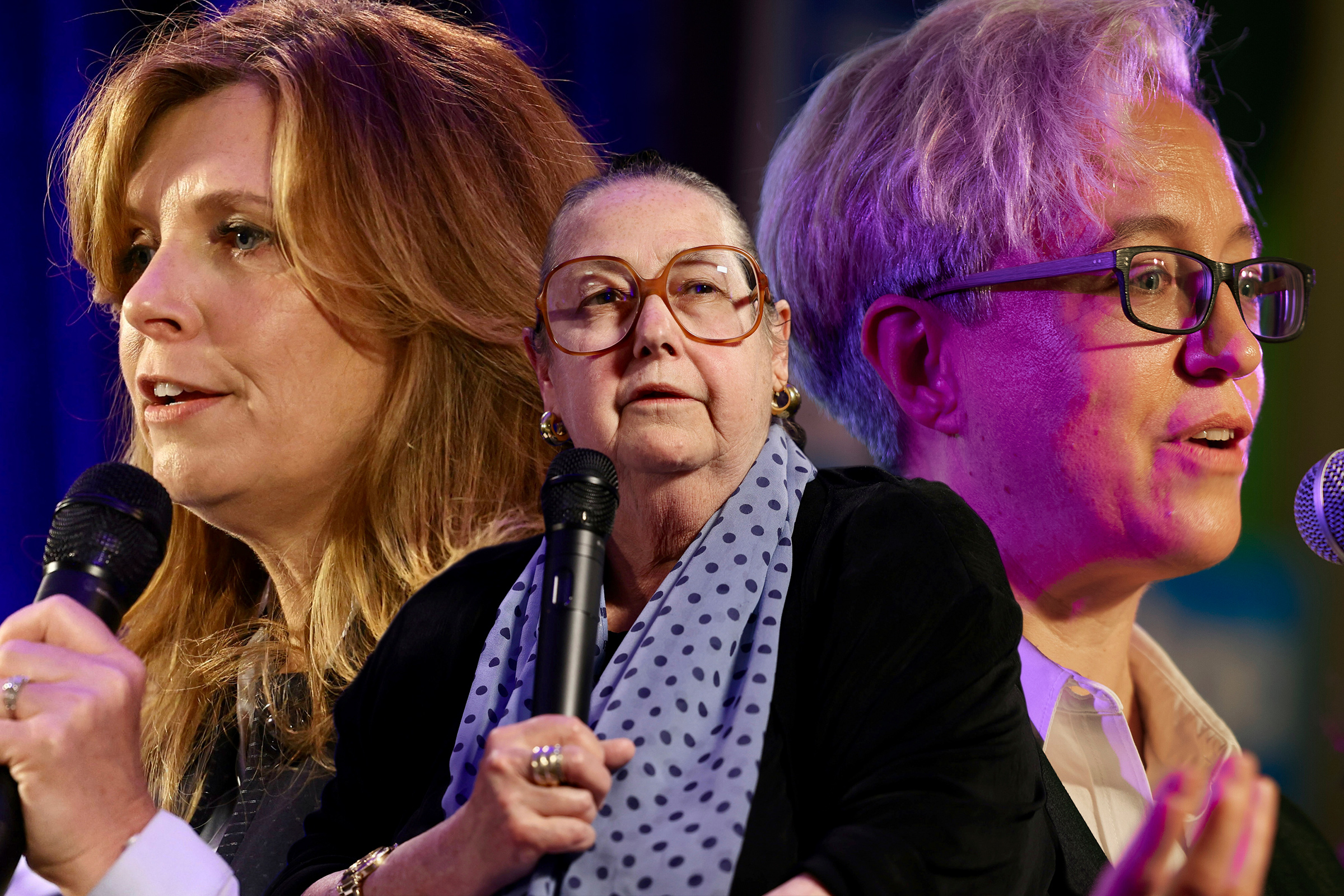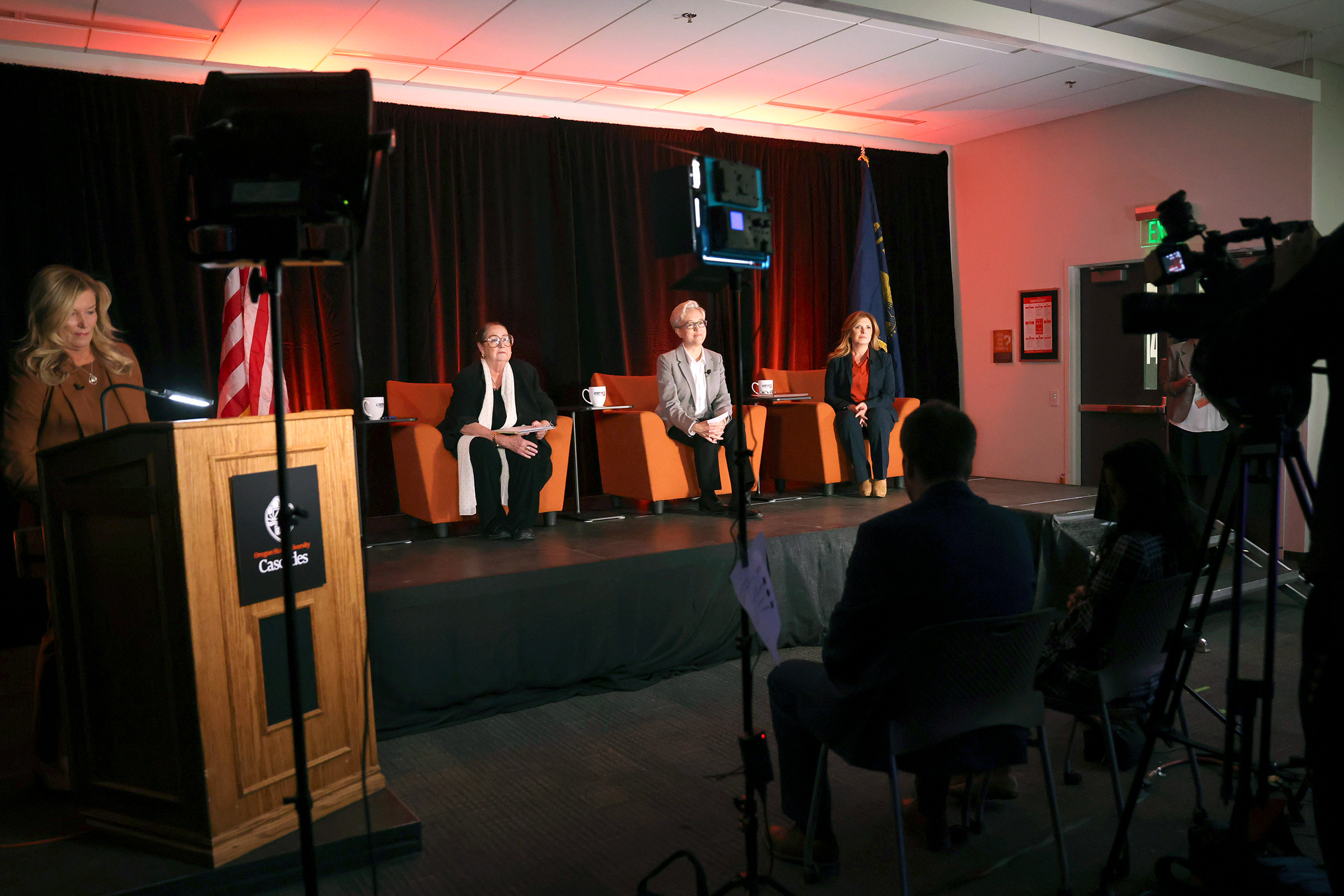
Oregon hasn’t elected a Republican governor in 40 years. The Beaver State is typically considered a haven for progressive policies, liberal drug laws, and broad social supports. But this year, Republicans might finally break their losing streak, and the race has put a spotlight on abortion rights in a state where many assumed the issue was settled.
That’s in part because Oregon’s race is a three-way competition among a trio of women candidates who all served in the state legislature. Republican Christine Drazan, the former minority leader of the Oregon House of Representatives, is locked in a close race against Democrat Tina Kotek, the former speaker of the Oregon House, who could become the first openly lesbian governor in the U.S. Betsy Johnson, who spent decades in the state legislature as a moderate Democrat and is now running as an unaffiliated candidate touting her support for gun rights and bashing “wokeness,” has complicated the political calculus. Johnson’s campaign started strong as she blasted both of her opponents as too extreme, but now she is trailing far behind the other two candidates, and Democrats worry she could be a spoiler that will hand state control to the GOP.
The contest is now rated a “toss-up” by both Cook Political Report and Sabato’s Crystal Ball, and recent polling averages showing Drazan barely ahead of Kotek. With all three candidates running well-funded campaigns, the next governor may not need to hit even 40% support, and the race has turned into something of a referendum on the effectiveness of candidates’ messaging on abortion post-Roe v. Wade.
In another election cycle, reproductive rights would not likely be a major focus in Oregon, which already has some of the most progressive abortion legislation in the country. But since the Supreme Court overturned the constitutional right to an abortion in Dobbs v. Jackson Women’s Health Organization in June, the topic has become a top concern for many voters, and Kotek is now sounding the alarm that her two opponents could jeopardize abortion policy in the state and across the region. Drazan is endorsed by Oregon Right to Life and has said she would “stand up for life by vetoing legislation designed to push Oregon further outside the mainstream,” while Johnson identifies as “pro-choice” but opposes spending state money to support out-of-state abortion seekers. Polling shows that Oregonians are more supportive of abortion than Americans nationally: 65% of likely voters in Oregon identified as “pro-choice” in a DHM Research poll in August, compared with 55% nationally in a Gallup poll from June. And 72% of Oregonians said abortion should be legal in most or all cases, according to a July poll from the nonpartisan Oregon Values and Beliefs Center, compared with 62% of Americans in a Pew Research Center survey.
Read More: 5 Governors’ Races That Will Define the Midterms and Trump’s Hold on the GOP
Kotek is making her support for abortion rights a major theme of her messaging, while Drazan has largely tried to avoid talking about her opposition to abortion in favor of issues like crime, homelessness, and the economy. As the candidates head into the final weeks of the campaign, the contest may prove a test for how much backlash to the fall of Roe is galvanizing Democrats, or whether Republicans can regain power by focusing on other issues that may animate voters even more.
“It’s a difficult issue for pro-life candidates to stay consistent on in Oregon and really have an opportunity to be successful at a statewide level,” says Rebecca Tweed, a Republican strategist in the state. “It’s an intelligent strategy of Drazan to try to lean into those other issues. It’s just whether that will ultimately be successful, and how long can you avoid the conversation?”
Kotek, who served as state House speaker from 2013 until early this year, emphasizes her role in crafting Oregon’s current abortion policies. Abortion is legal throughout pregnancy in the state, and Kotek wants to help people from all corners of Oregon—as well as neighboring states like Idaho that have now banned abortion—access the procedure. “Oregonians today are impacted by what the Dobbs decision brought forth,” Kotek tells TIME. She notes that people in the eastern part of Oregon previously sought health care in Idaho, and now with that state’s total abortion ban, they may need to travel longer distances; about 78% of Oregon counties have no abortion provider, according to the Guttmacher Institute, a research firm that supports reproductive rights. Kotek helped pass legislation that codified abortion access into state law in 2017 and supports a $15 million fund the state established this year to help patients from Oregon and other states access reproductive health care including abortions. She says she would also like protect Oregon abortion providers from prosecution by other states that have laws restricting abortion and explore amending the state constitution to protect abortion.
Johnson also describes herself as “pro-choice” and tells TIME that her “presence in the race has given pro-choice moderate Ds someplace to go.” She notes that she previously served on the Planned Parenthood board and, like Kotek, criticizes Drazan’s anti-abortion views as “too extreme” for Oregon. But Kotek and abortion rights advocates have slammed Johnson for letting a local anti-abortion politician who ran in this year’s GOP gubernatorial primary lead her “Republicans for Johnson” effort. That woman, Bridget Barton, said in June that she thought Johnson and Drazan were “virtually identical” on the issue of abortion. Johnson called the criticism a “manufactured political mythology” in an interview with TIME and said Barton didn’t reflect her views. Rather than focusing on abortion, Johnson has spent time telling voters what she sees wrong with the state’s current direction and promising to support more “balanced” business-friendly policies.
Johnson has raised more money than either of the other candidates despite her lagging poll numbers—including from Nike co-founder Phil Knight, who gave her $3.75 million in the first nine months of this year, until he appeared to switch his focus this month and gave $1 million to Drazan.

Drazan, meanwhile, has tried to fully steer clear of the abortion conversation in recent weeks. Her campaign declined an interview with TIME, but in recent debates and appearances she has complained her opponents are using abortion to “distract and divide” voters and insisted she will follow the law if elected. This marks a contrast from earlier in the campaign, when Drazan touted her endorsement from Oregon Right to Life during the GOP primary, ran ads on Facebook saying she “will be a voice for the sanctity of life,” and cheered the Supreme Court’s decision to overturn Roe v. Wade. When the decision came down in June, Drazan tweeted “life wins!” and told local news outlets that she would act on her views if elected governor. “I will stand up for life by vetoing legislation designed to push Oregon further outside the mainstream,” she said at the time. She also scrubbed her campaign’s website of some mentions of her anti-abortion views.
The Republican Governors Association, which has spent $4 million on the race including $2.5 million in the last month, argues that Drazan is focusing on issues important to voters. “Christine Drazan is talking about the homeless, crime, and cost of living crises because those are the issues top of mind for every voter after nearly a decade of decline under Kate Brown, Tina Kotek, and Betsy Johnson,” Kaitlin Price, a spokesperson for the Republican Governors Association, said in a statement to TIME. She also noted that a recent poll from The Oregonian/Oregon Live found that the top issues for voters in the governor’s race were homelessness, crime, poor leadership, and affordable housing. Abortion scored much lower as a “top issue,” but 55% of voters said abortion would be “very important” to their choice, much higher than in other recent elections in the state.
While abortion will remain legal in Oregon even if Drazan wins, Kotek and abortion rights advocates note that the governor can affect how thoroughly policies like the state’s new $15 million fund for abortion seekers are implemented, can veto future legislation, and can appoint and judges, which are increasingly important to state fights over abortion now that there’s no national standard. The Democratic Governors Association is also spending heavily on the race, having given $4.9 million to Kotek as of this week. And Planned Parenthood, which has endorsed Kotek, views the contest as important nationally as the number of providers in other states dwindles, according to An Do, executive director of Planned Parenthood Advocates of Oregon. “With more and more states moving to ban abortion, that network has even gotten more threadbare and more sparse,” Do says.
There is at least one point of unity between the three candidates: Kotek says she agrees with Drazan and Johnson that “things are not working well in Oregon.” But an unresolved question is how voters think abortion rights should play into their state’s future, and there, Kotek hopes she has the winning message. “I believe that everyone should have access to health care,” she says. “We have to be a leader in the country to help anyone who needs that care.”
More Must-Reads from TIME
- Cybersecurity Experts Are Sounding the Alarm on DOGE
- Meet the 2025 Women of the Year
- The Harsh Truth About Disability Inclusion
- Why Do More Young Adults Have Cancer?
- Colman Domingo Leads With Radical Love
- How to Get Better at Doing Things Alone
- Michelle Zauner Stares Down the Darkness
Write to Abigail Abrams at abigail.abrams@time.com